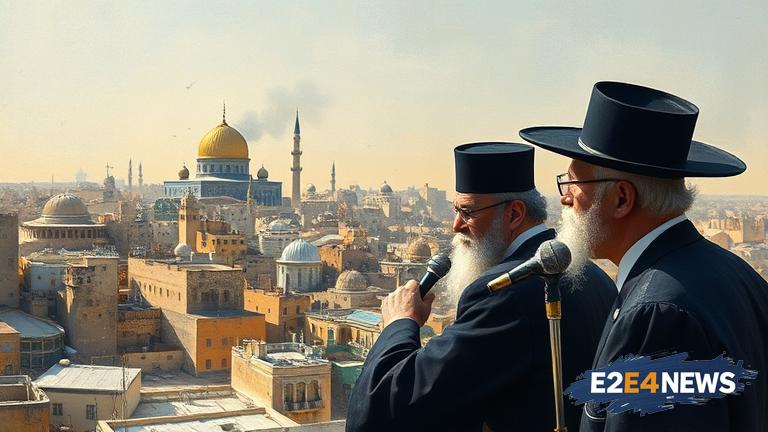A recent statement by a group of Orthodox rabbis on the Gaza conflict has been met with criticism and controversy, with many arguing that it ignores critical facts about the war. The statement, which was released in response to the ongoing conflict between Israel and Hamas, has been accused of being one-sided and failing to acknowledge the complexities of the issue. According to the statement, the rabbis expressed their support for the Israeli government’s actions in Gaza, citing the need to protect Israeli citizens from Hamas’ rocket attacks. However, critics argue that the statement fails to mention the significant humanitarian crisis in Gaza, including the high number of civilian casualties and the devastating impact on the region’s infrastructure. The statement has been criticized by many in the Jewish community, who argue that it does not accurately reflect the nuances of the conflict. Some have also accused the rabbis of being overly simplistic in their assessment of the situation, failing to take into account the historical and political context of the conflict. The controversy surrounding the statement has sparked a wider debate about the role of religious leaders in addressing complex geopolitical issues. Many are questioning whether religious leaders should be weighing in on such issues, and whether their statements can be seen as representative of the broader Jewish community. The debate has also highlighted the challenges of addressing the Israeli-Palestinian conflict, which is a deeply complex and emotive issue. The conflict has been ongoing for decades, with both sides having legitimate claims and grievances. The situation in Gaza is particularly dire, with the region facing significant economic and humanitarian challenges. The Israeli government’s actions in Gaza have been widely criticized, with many arguing that they are disproportionate and violate international law. However, others argue that Israel has a right to defend itself against Hamas’ rocket attacks, and that the government’s actions are necessary to protect its citizens. The controversy surrounding the Orthodox rabbis’ statement has also sparked a wider discussion about the importance of nuance and balance in addressing complex issues. Many are arguing that religious leaders should strive to provide more nuanced and balanced assessments of complex issues, rather than relying on simplistic or one-sided statements. The debate has also highlighted the need for greater education and awareness about the Israeli-Palestinian conflict, particularly among religious leaders. By providing more accurate and nuanced information, religious leaders can help to promote greater understanding and empathy, and work towards a more peaceful and just resolution to the conflict. The controversy surrounding the statement has also sparked a wider discussion about the role of social media in shaping public discourse. Many are arguing that social media platforms have a responsibility to promote more nuanced and balanced discussions of complex issues, rather than allowing simplistic or one-sided statements to dominate the conversation. The debate has also highlighted the importance of critical thinking and media literacy, particularly in the digital age. By promoting greater critical thinking and media literacy, individuals can better navigate complex issues and make more informed decisions. The controversy surrounding the Orthodox rabbis’ statement has also sparked a wider discussion about the importance of interfaith dialogue and cooperation. Many are arguing that religious leaders from different faith traditions should work together to promote greater understanding and empathy, and to address complex issues in a more nuanced and balanced way. The debate has also highlighted the need for greater cooperation and collaboration between different faith communities, particularly in addressing complex geopolitical issues. By working together, religious leaders can help to promote greater understanding and empathy, and work towards a more peaceful and just resolution to the conflict. The controversy surrounding the statement has also sparked a wider discussion about the importance of accountability and transparency in public discourse. Many are arguing that religious leaders should be held accountable for their statements, and that they should be transparent about their motivations and biases. The debate has also highlighted the need for greater accountability and transparency in public discourse, particularly in the digital age. By promoting greater accountability and transparency, individuals can better navigate complex issues and make more informed decisions.
